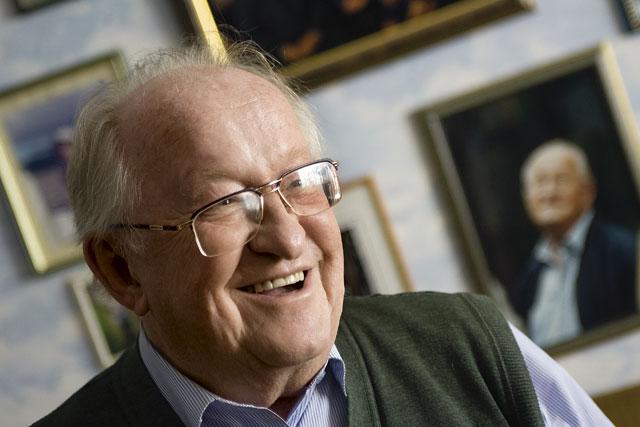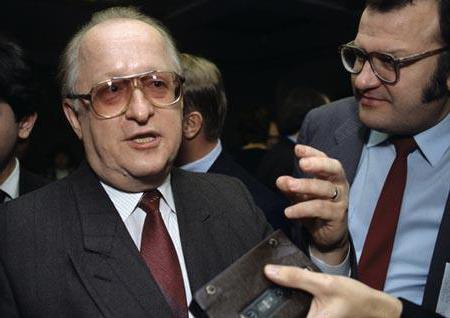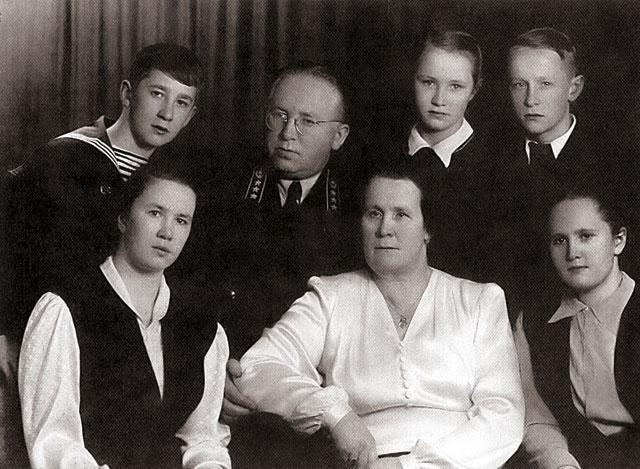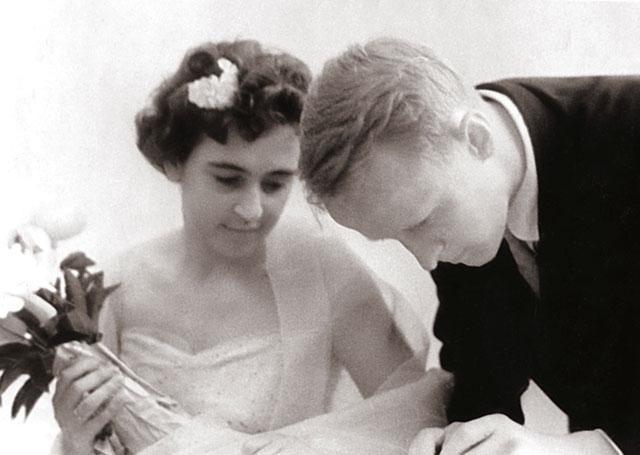Gerashchenko Victor is a banker with an impeccable reputation. That is how he is known to most colleagues. His name has long been a household name. Among financiers and bankers, Gerashchenko is called Heracles. The inhabitants perceive his comments and explanations as the ultimate truth. In this article, you will be presented with a brief biography of the banker. So let's get started.
Study
Gerashchenko Victor Vladimirovich (family, children, photos of the hero of this article are presented below) was born in 1937 in Leningrad. In 1941, the whole family had to evacuate first to Kazan, and then to Kuibyshev. They managed to return to their hometown only two years later. After leaving school, Victor planned to enter a law university, but it was closed in 1956. Vladimir Sergeyevich (father) advised the young man to study economics. The future banker did not think long and went to enter the financial institution in Moscow.
Job
After completing his studies, Gerashchenko Victor immediately got a job as an accountant in the USSR State Bank. A year later, he moved to the same position at Vneshtorgbank. In 1963, Victor Gerashchenko, whose personal life had already been arranged, went on his first foreign trip to London. Two years later, a branch of the Moscow People's Bank was opened in this city. And this institution was headed by Victor. Some media outlets explained Gerashchenko’s fast-paced career with his father’s connections. Vladimir Sergeevich at one time served as deputy chairman of the State Bank of the USSR.

Near East
In 1969, Victor Gerashchenko was transferred to Beirut (Lebanon) as a branch manager. Credit services of the Moscow People's Bank (MNS) were also in demand there. In Beirut, Gerashchenko met with Yevgeny Primakov. At that time, the future Prime Minister of the Russian Federation worked in the publication Pravda, sanctifying events in the Middle East. The Izvestia newspaper noted then that Gerashchenko’s stay in this region coincided with the time of the greatest penetration of Soviet politics into Arab countries. The publication also noted the role of Lebanon in the 1970s as the largest center for intelligence activity in the USSR. It was there that all Middle Eastern agents were recruited. And thanks to the liberal financial legislation in this country, the MNS could finance "anyone."
New countries
In 1972, Gerashchenko Victor Vladimirovich (nationality - Russian) became deputy head of Vneshtorgbank. And two years later he took the post of chairman of the board of Ost-West Handelsbank (Frankfurt). In 1976 Gerashchenko joined the board of the Soviet Bank in Germany. And a year later he became the head of the Singapore branch of the Ministry of National Security. He held this position until 1982. During this time, the hero of this article managed to go on a business trip to Zurich several times.
Return to the USSR
In 1982, Victor Gerashchenko joined the Bank for Foreign Economic Affairs of the USSR as the head of department. He later became vice chairman. In 1985, the hero of this article moved to Vneshtorgbank in the same position.
Monetary reform
In 1989, Gerashchenko Viktor Vladimirovich headed the State Bank of the USSR. At the same time, he actively began to communicate with Yegor Gaidar. Gerashchenko also met Putin, who was then working as an adviser to Sobchak. By order of the head, Vladimir Vladimirovich was engaged in the development of the branch of the State Bank in St. Petersburg.
In 1991, Gerashchenko announced to the whole population about the monetary reform of Prime Minister Valentin Pavlov.According to it, a ban was introduced on the circulation of old bills (50 and 100 rubles), and the bank deposits of the population were frozen. Since then, according to analysts, the popularity of the hero of this article in the country has fallen dramatically.
New position
At the end of 1991, Gaidar (acting Prime Minister) offered Gerashchenko the position of Chairman of the Central Bank of the Russian Federation. After the dissolution of the USSR, this credit institution became the main issuing institution in the country. Gerashchenko Victor agreed to lead it with one condition: he will take former colleagues from the State Bank on the team. Gaidar went to meet him. Deputy Gerashchenko became Sergey Ignatiev. He was supposed to be in charge of macroeconomics and monetary policy.
Criticism
In 1993, the Central Bank's monetary reform was severely criticized by Fedorov (Minister of Finance of the Russian Federation). During it, it was planned to exchange old bills for new ones. Thus, the Central Bank planned to cut off the money supply circulating in the former Soviet countries. The exchange was carried out in a very short time, which contributed to panic among the population. President Yeltsin intervened and significantly extended the exchange period. But this did not restore confidence in the authorities. In July 1993, a press conference was organized, where Fedorov announced the senselessness of this action and the absence of any economic effect. The Minister of Finance called Viktor Vladimirovich the main culprit of the incident and demanded his resignation. Gerashchenko told reporters that he was not going to leave anywhere, and did not receive any proposals for resignation. And he explained the attacks on the part of Fedorov by the desire of the minister to shift the blame for the failure of financial policy to the Central Bank.

Resignation
At the end of 1994, Gerashchenko Viktor Vladimirovich (photos of an economist are attached to the article) nevertheless left the post of head of the Central Bank. In an interview, he stated that he had done this at the personal request of Yeltsin. The president himself explained the dismissal of Gerashchenko solely for political reasons. The actual reason for the resignation of Viktor Vladimirovich was “Black Tuesday” (October 11, 1994). On that day, the Central Bank tried to increase the purchasing power of the dollar. This led to the collapse of the ruble, multiple currency speculation and panic among the population. At that time, the Izvestia newspaper voiced the real reason for Gerashchenko’s resignation. According to the publication, Yeltsin never considered the head of the Central Bank "his man." The new chairman of the Central Bank was Andrei Dubinin.
Moscow bank
In 1996, Viktor Vladimirovich Gerashchenko (family, economist's children were nearby and supported him) received a new position. He headed the International Moscow Bank (IMB), where he worked for two years. During this time, the profit of the organization has increased significantly due to trade in federal loan bonds. A few days before the 1998 crisis, IMB withdrew all funds from the market.

Return to the Central Bank
After the default, Viktor Vladimirovich Gerashchenko, whose family will be described below, returned to the post of chairman of the Central Bank. This happened after the resignation of Dubinin. The initiator was Yeltsin himself, who was supported by the majority of State Duma deputies. After that, Viktor Vladimirovich took a tough stance against the presidential administration. For all key posts, Gerashchenko appointed former colleagues from the Central Bank and the State Bank: Nadezhda Savinskaya, Lyudmila Gudenko, Konstantin Shor and Arnold Voilukov.
Restructuring program
For the hero of this article, it was obvious that the banking system needed to be changed. Therefore, at the end of 1998, Gerashchenko sent the “Restructuring Program” to the State Duma. For its implementation, Viktor Vladimirovich proposed the creation of ARCO (Agency for Restructuring the Banking System). Moreover, it had to be completely subordinate to the Central Bank. However, this agency was registered as a non-bank credit organization. In the authorized capital of ARCO, 51% of the shares belonged to the state and only 49% of the Central Bank.However, the head of the supervisory board was still appointed by Gerashchenko himself. A few months later, Viktor Vladimirovich wrote a letter to Yevgeny Primakov (Prime Minister). In it, he proposed not to engage in restructuring the entire banking structure. Gerashchenko believed that it was worth concentrating on creating a stable payment system. That is, to leave the banks only “providing deposit and credit services and conducting settlements”.

Interrogation at the Prosecutor General
At the end of 2000, several media outlets, citing sources in the Central Bank, published news about the hero of this article. The thing is that the Prosecutor General’s Office became interested in the activities of Gerashchenko (with the filing of Yeltsin’s entourage). The investigation checked four episodes of the withdrawal of substantial amounts abroad. But the criminal case was never opened.
In January 2001, Viktor Vladimirovich was summoned for interrogation. The investigator asked him questions about the stabilization loan criminal case that the Bank of Russia issued to SBS-Agro during the 1998 crisis. The amount has not been repaid. The whole charge was based on the fact that the loan was used for other purposes. Gerashchenko was a witness in the case. The results of the interrogation did not reach the press.
Resignation
In March 2002, Viktor Vladimirovich left the post of head of the Central Bank ahead of schedule. The new chairman was Sergei Ignatiev. According to several media reports, the dismissal of Gerashchenko was initiated by Prime Minister Mikhail Kasyanov. He lost confidence in the economist after discussing in the State Duma the idea of developing the banking system. Then the representatives of the Central Bank changed their mind regarding the Central Bank withdrawing from Vneshtorgbank's capital. Viktor Vladimirovich left just in the midst of this discussion.

Politics
For some time, Gerashchenko worked as a senior research fellow at the Central Bank Research Institute. And in 2003, he became a State Duma deputy from the Rodina party. A few months later, colleagues nominated him as a presidential candidate. But the CEC refused to register Viktor Vladimirovich, as he did not get the two million required signatures of voters. In addition, Gerashchenko could not become a candidate due to his nomination by only one of the three co-founders of the "Homeland".
In February 2004, the banker was elected co-chair of the party. At the same time, Viktor Vladimirovich continued to be part of the Duma fraction "Homeland". But in July Gerashchenko left the party.
Yukos
In the same 2004, the management of the oil company suggested the banker to head the board of directors for three years. Despite the adverse events that took place around Yukos then, the company was still the largest producer of “black gold” in the country. About 1.7 million barrels of oil were produced per day. In second place was LUKOIL with 1.66 million.
After the arrested Khodorkovsky found out about the results of Gerashchenko’s work, he asked the shareholders (through his lawyer) to remove him. After all, the former chairman of the Central Bank could not agree with the authorities and postpone the payment of debt. But the shareholders did not agree with the opinion of Khodorkovsky.
Elections
In May 2007, it became known that Gerashchenko Viktor Vladimirovich put forward his own candidacy for the presidency of the Russian Federation. Before the 2008 election, he gave many interviews. Also, Viktor Vladimirovich took part in a meeting of an expert club at the Institute of National Problems. There Gerashchenko said that he intends to run for the opposition as a single candidate, as he is very concerned about the "mess in the social and economic spheres." But the former banker did not disclose which particular parties offered him to participate in the elections. And the representatives of the opposition themselves could not agree on the nomination of a single candidate. As a result, Gerashchenko did not participate in the elections.

Care
In March 2009, several well-known media outlets published information that Viktor Vladimirovich works as a consultant in the Far Eastern Transport Group (railway operator).The main duty of Gerashchenko was the settlement of debts. However, a number of experts doubted the authority of the former banker in relation to solving financial problems. Viktor Vladimirovich himself denied press reports and said that he was not officially a consultant.
In 2010, Gerashchenko gave an interview in which he stated a lack of interest in the banking system. Viktor Vladimirovich ceased to be interested in economics. Also, the hero of this article said that he has in his account 50 thousand $ invested in Chinese papers.
Family
Gerashchenko Victor Vladimirovich, whose biography was presented above, married to Drozdkova N.A. Banker met her at the institute. In 1961, the couple had a daughter - Tatyana (she graduated from the Pedagogical Institute, currently works in an insurance company). And in 1969, his son Konstantin (graduated from the Institute of Economics and Statistics, served two years in the Marine Corps, now works in a commercial bank).









